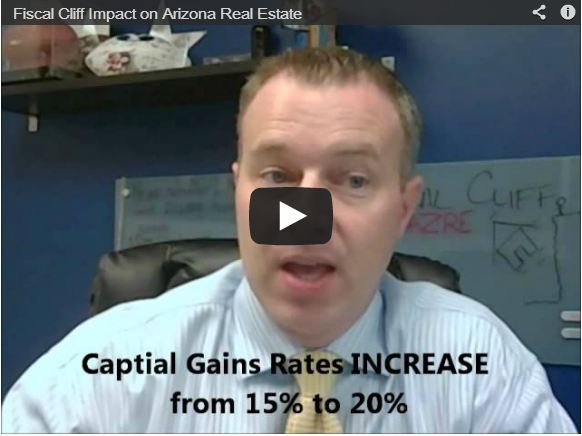The Fiscal Cliff could greatly impact the investment sector of the Arizona housing market, and many should find the anti-deficiency statutes of the state provide more protection than originally thought. Real estate owners and investors need to be aware of the impending changes associated with the fiscal cliff, and keep a close eye on their investments, and ultimately their bottom dollar.
- Mortgage Interest Deduction Eliminated — Perhaps the most guarded of all deductions in the tax code, the mortgage interest deduction, is set to completely disappear from the tax code as of 2013. This means anyone owning a property and deducting the interest they pay on that mortgage will no longer be allowed to take that deduction.
- Increase in Capital Gains — Presently the income derived from capital gains is given a favorable tax rate of 15%. The idea behind this favorable tax rate is a person’s money was already taxed once before it was invested. This favorable treatment is used to induce investor to put their money in stocks, real estate, and other investment vehicles. Come 2013, the Fiscal Cliff will cause the 15% rate is set to jump to 20%. For investors this can be a hefty increase on their bottom line.
- Obamacare Tax — The beginning of 2013 will also bring with it the implementation of a tax to help fund Obamacare. A 3.9% tax on most investment income is set to begin. This means real estate investors need to be aware of the rules surrounding their properties and the income derived. There are ways to get around paying the 3.9% investment income tax, but investors need to seek the professional advise of a tax or real estate attorney and/or a CPA.
- Mortgage Forgiveness Debt Relief Act Expires — Many credit this tax exemption for much of the housing industry’s recovery. The Act removes from a tax payer’s income debt that was forgiven in the foreclose or short sale of their property provided it was money used to purchase or substantially improve the property. The Act, which went into effect in 2007, was passed with an expiration of Dec. 31, 2012. This means unless a deal is reach the forgiveness of that debt will again be counted as income. However, in Arizona that may not be as big of a factor as many Realtors have led homeowners and investors to believe because we are an anti-deficiency state.
Our real estate market in Arizona is a primary driving force within our economy. The impact the fiscal cliff will have on investors and the income tax they pay off their investment income has the potential to have a significant negative impact on the real estate market and our property values.
To find out how the Fiscal Cliff applies to you, call and schedule a FREE LEGAL consultation with an attorney at Wells Law Group — 480.428.3290.


